#utena production materials
Explore tagged Tumblr posts
Text
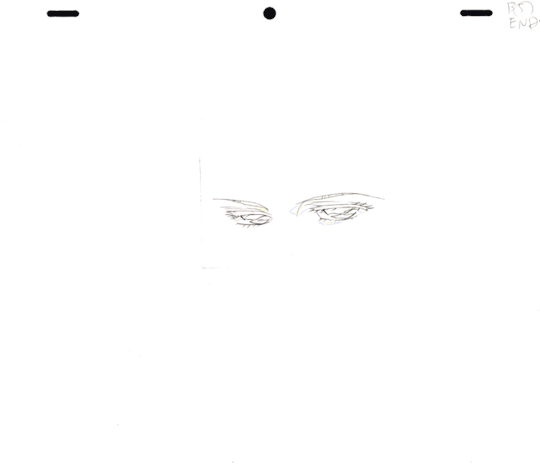
JadeSabre nabbed this incredible piece of production material, the key cel douga and accompanying individual frames of Anthy's eyes as she stabs Utena in episode 38. They're in beautiful condition and Jade was kind enough to get them scanned. I made this GIF to show them off, and you can check out the gorgeous originals below! Thanks so much @jadedofmara!
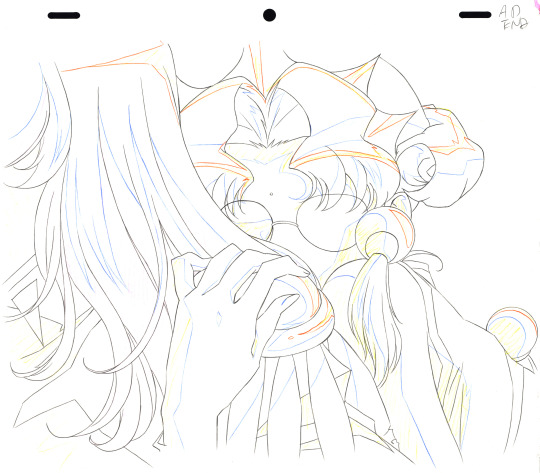


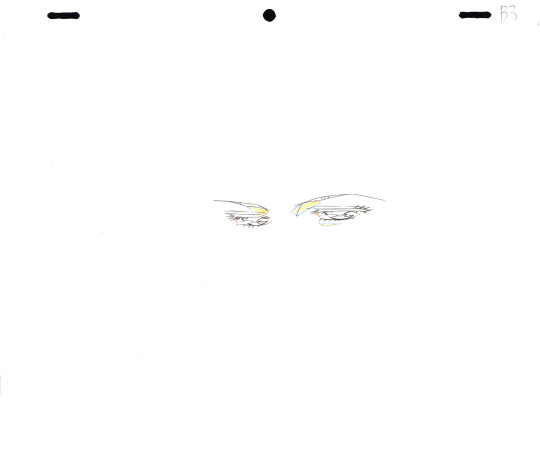

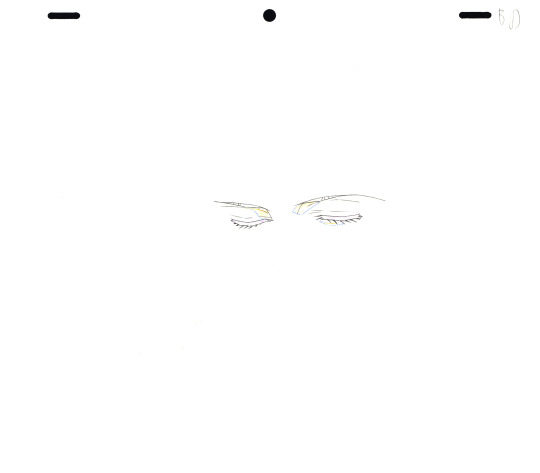
#Utena#Utena meta#Revolutionary Girl Utena#Anthy#Blink of betrayal#Utena production materials#Anime production material#Douga#Utena douga#Cool stuff
2K notes
·
View notes
Text
By the way is anyone here in love with anime production material / settei too? Storyboards, color design, model sheets, keyframes etc etc--- WELL


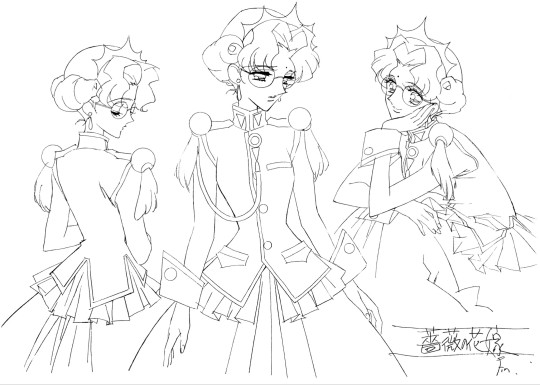
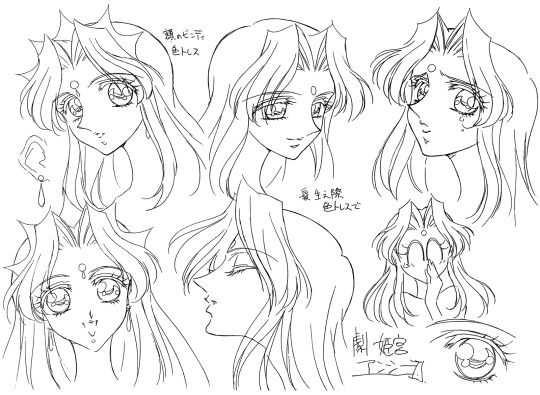
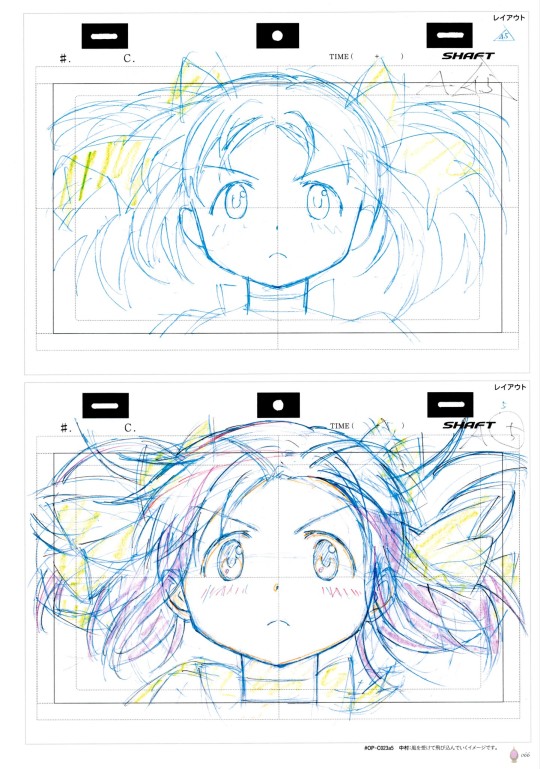
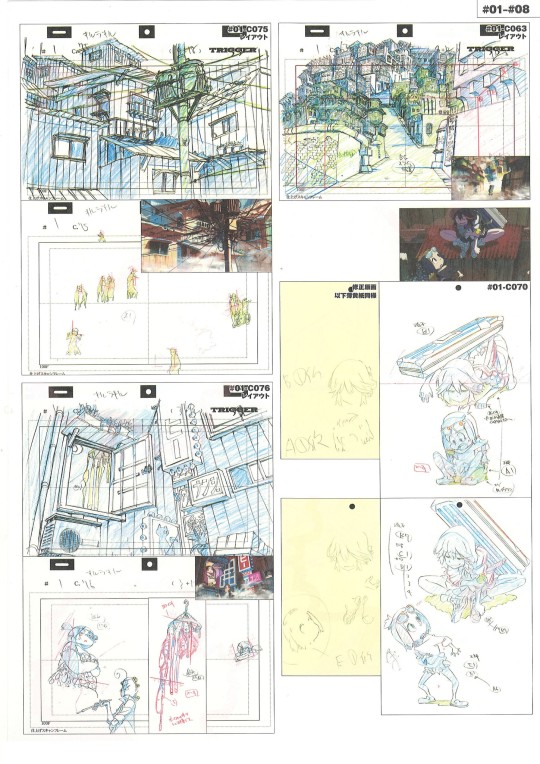
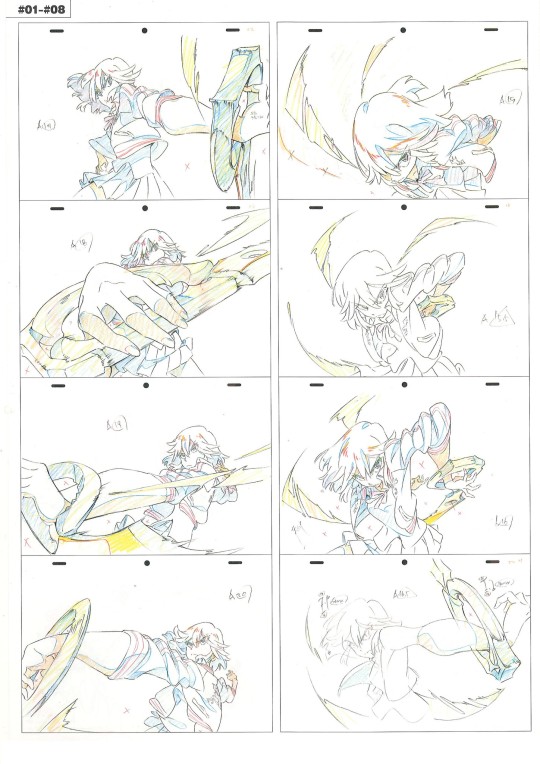
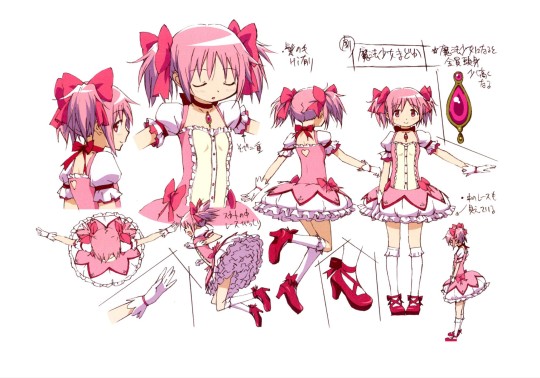
There's a community making an archive of that stuff accessible! There's a VERY wide variety of anime in their collections, and their scans are pretty high quality and well-curated. It's a fantastic resource if you need character design refs, insight into the anime industry, or just like cool sketches and art.
As per the website's terms, "Please do not print and resell [their] settei for your own profit." All images shown in this post are from the link above.
#also I'm not part of the scan community#just a lurker#but i love this site so much and their actively updating it.#revolutionary girl utena#rgu#kill la kill#klk#jojo#jjba#jojo's bizzare adventure#pmmm#puella magi madoka magica#reference#ref#anime#settei#production material
435 notes
·
View notes
Text
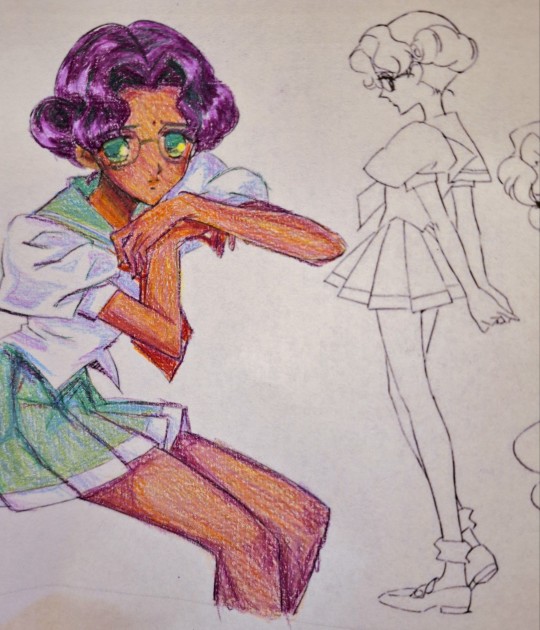
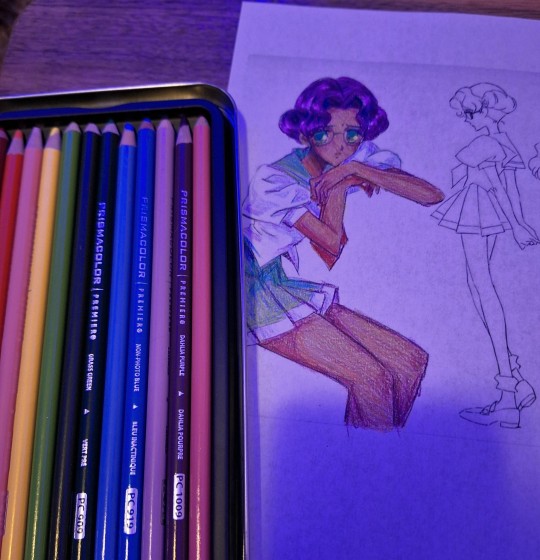
felt bored tonight so i decided to print out and color some production material from utena :3
i was a bit limited in my color choice since i only had access to botanical prismacolors, but through the power of color mixing i think it turned out alright :)
#my art#revolutionary girl utena#rgu#anthy himemiya#man i have not done anything with colored pencils in a looooong time#i was looking for something to color and then realized production material might work since a lot of it is just lines#so. here we are!!#might color in the rest of this at some point but not now#this one section already took me like. an hour#also just to clarify just in case. this isnt real production material. i just want to make sure no one thinks this is real 😭😭#i just printed it out on printer paper
110 notes
·
View notes
Text
Revolutionary Girl Utena: Gender in Context
beneath the cut, I discuss the RGU's portrayal of gender in the context of 1990s Japan.
in Ikuhara's interview with Mari Kotani, he stated that in traditional Japanese society, "prince" meant "patriarch." the same is true in Western societies--there was a time when a prince would be an heir to a royal line. by 1997, this meaning had died out of large parts of the world. even the association between princes and traditional masculinity was fading. Saionji, the weakest, most pathetic man in the show, is a parody of historical Japanese masculinity, with his kendo and his blatantly regressive beliefs about women.
in RGU, prince may still mean patriarch, but in a far more subtle fashion. Ikuhara and Kotani discussed the changing expectations for men in the latter half of the 20th century--it became gauche to fight over a woman with one's brawn, so instead, power struggles were played out in the arena of looks and sex appeal. one can see this reflected in the character Akio, whose power as a prince arises from his ability to turn "easy sensual pleasure based on dependency" "into a selling point with which to control people."
Akio has his moments of showboating masculinity, but when preying on Utena, he operates by making himself seem non-threatening and soft.
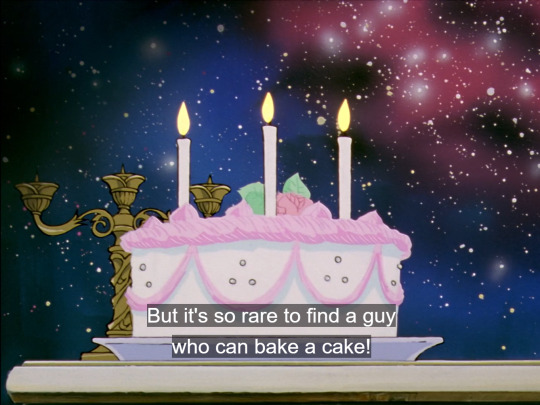
not only that, but he purports to want to allow students to express their individuality and thus approves of Utena's masculine form of dress. this is a front--by the end of the show, he's telling Utena that girls shouldn't wield swords. thus, through Akio's character, the show argues that traditionalist patriarchy in Japan isn't gone, but instead has only been papered over with false progressivism.
with all that said, there seems to be more to the character. he's taken the family name of his fiance, Kanae, and whatever material power he has in the school is dependent upon her family. in Japanese society, this is considered a humiliating position to be in, something that only a shameless man would do. the show never gives the audience any insight into how Akio feels about this--is he unbothered entirely, or are his actions against the Ohtori family an expression of his repressed anger? does he harm the children under his care to compensate for his humiliation?
this aspect of Akio's character may seem irrelevant in light of the larger, immaterial social forces at work in the show. however, I would argue that it was included for a reason. Akio, despite his status as ultimate patriarch of Ohtori, is in fact a highly emasculated character, to the point where lead writer Enokido even said that he is driven by an infantile mother complex.
to explain why Akio was portrayed this way, we have to discuss Japanese history. the nation suffered a major defeat in WWII and was forced to accept whatever terms the United States laid out for it. for an examination of how the Japanese have never truly processed those events and have plunged into modernity with reckless abandon, I recommend Satoshi Kon's Paranoia Agent. to sum it up briefly, in a very short period, the nation regained its economic footing, and by the 1980s had the largest gross national product in the world. this economic boom may have allowed Japan to maintain a sense of sovereignty, dignity, and power, but it was inherently fragile.
the infamous "bubble economy" lasted from 1986 to 1991. during this time, anything seemed possible; financial struggles appeared to be a thing of the past, and capitalist excess reached new heights. the ghosts of this period can be felt across Japanese media; for instance, think of the final shot of Grave of the Fireflies (1998), where the two dead children look down on Kobe, glowing an eerie green to imply its impermanence. the abandoned theme park from Spirited Away (2001) is explicitly referred to as a leftover from the previous century, when many attractions were built and then tossed aside in a few short years.
the bubble popped in 1992, leaving an entire generation feeling cheated. the bright futures they'd been promised, which had actually materialized for their parents and older siblings, had been lost to them overnight. economic crises are often accompanied by gender panics. to quote from Masculinities in Japan, "The recession brought with itself worsening employment conditions, undermining the system of lifelong employment and men’s status of breadwinners in general. The unemployment rate was rising, and although it never reached crisis levels, men could no longer feel safe in their salaryman status. Their situation was further complicated by the rising number of (married) women entering the workforce."
with this in mind, Akio's character can be taken as a representation of masculinity in crisis in 90s Japan. he's forced to rely on women for his position in life and has failed to save his only relative, Anthy. he tries to escape his misery through hedonism, perhaps an allegorical representation of how men tried to maintain their old standard of living after the economic bubble burst.
but of course, Akio is not the main character of RGU--the story is about girls. mangaka Yamada Reiji discussed the series in the context of the 90s, stating the following:
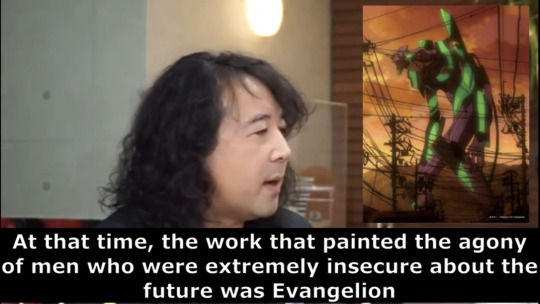
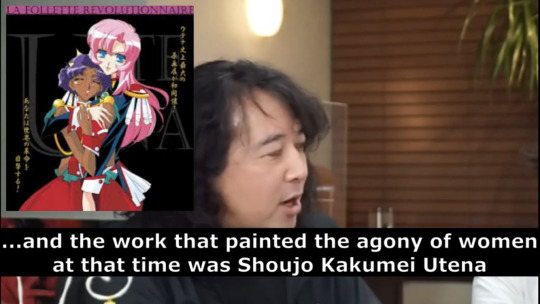
while I opened this essay by discussing the prince, the same points could be made about the princess. despite the increasing irrelevance of royalty, princess is still an important concept. how does it relate to the socioeconomic landscape of the 90s?
in Yamada's view, RGU is full of relics of the 80s; for instance, the figure of the ojou-sama, an entitled young woman who never lifts a finger for herself. during the economic bubble, it was increasingly common for women to be entirely taken care of by the men in their lives. Yamada names Nanami as a clear ojou-sama type character: she weaponizes her femininity, demanding to be rescued, doted on, and served.
however, by 1997, the ojou-sama could no longer expect to get what she wanted. from the 80s to the 90s, the percentage of women in the workforce increased around 15%; it was no longer viable for most women to be "kept" by their families. as the men experienced the humiliation of not being able to provide for their wives and children, women were undergoing a disillusionment of their own.
Yamada blames Disney for creating the ideological structure which led women astray. obviously, the company is known for its films about princes rescuing princesses. in Yamada's recounting, during the 80s, the company was infiltrating Japan through its theme parks as well; across the country, Disneylands were opening up, and people were buying into the escapism the corporation offered. Japan, as America, became a country of eternal children. its people were waiting for a prince to appear and save them.
but fairy tales can't stave off reality forever. Yamada claims that RGU embodies the rage of young women who woke up one day and realized that they had been raised on a lie. this anger pervades the work from beginning to end.
though RGU was created in a particular social context, its lessons can be extrapolated to any time and place. as the first ending tells us:
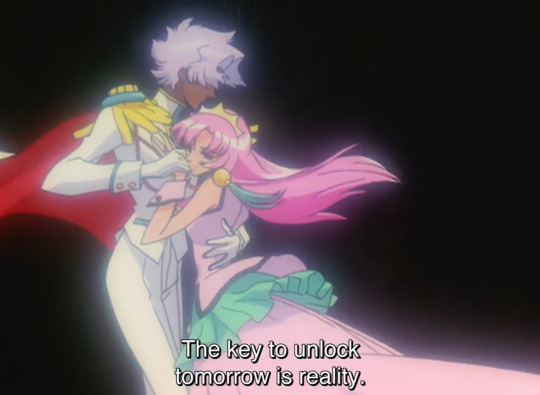
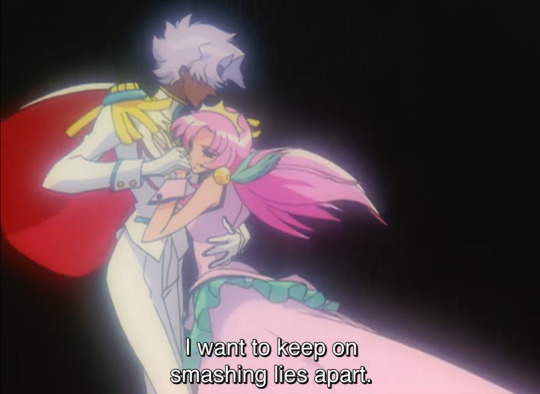
I hope this essay helped provide more context for the series. thanks for reading!
#rgu#commentary#revolutionary girl utena#this was originally a part of another essay but i revamped it and added a lot more detail
812 notes
·
View notes
Note
what do you think about the incestuous relationships in revolutionary girl utena, and the root causes of the abuse? one of my favorite analyses I've read so far talked about how rape and incest aren't deviant, they are an extension of the patriarchal family unit. And do you have any thoughts/analysis about how it specifically manifests in RGU and the way the narrative communicates these themes?
It's so annoying the way some people act like the incest is just regular brother and sister complexes that's common in a lot of anime, and not an integral part of the show's themes about the Family fostering an environment ripe for abuse. The show treats these heavy themes seriously, and I wish I was smart enough to articulate my thoughts about Miki and Kozue, Anthy and Akio, etcetera. Hence, this ask.
Jsjsksks I know I sent an ask just yesterday about Revolutionary Girl Utena, but your analysis is so cohesive, and I really appreciate you bringing family/marriage abolition and amato-normativity into your analysis posts. It's very affirming to me as an aromantic asexual.
thank you so much! i will admit i also have a hard time putting my thoughts about these themes into words, because they are . a lot, so forgive me if this is a little rambl-y. but they are a huge and very important part of the show, so they're important to talk about.
i think i know the analysis you're talking about, and it's spot on. every kind of abuse we see in the show is a product of The System (patriarchy, the school system, the nuclear family, etc.) that's not to say that the abuse isn't purposeful, or that it doesn't often come from people choosing to do harm, but their ability to cause that harm is facilitated by these systems. for example, the system is not forcing akio to do what he does (although it is the reason he knows it will get him what he wants) it is just giving him the tools to do it effectively. abuse does come from people, but the systems are what makes the abuse so effective, and that's why we need to dismantle them.
this is something i've mentioned before, but a big part of why anthy was so trapped in her situation until the end, is because of the expectation to value family above all else, and to always love and forgive them no matter how they hurt us. and that is the reason why incest is so inherently toxic and abusive. it's not that it's "gross and unnatural" (such rhetoric really only serves to hurt and alienate victims anyway) it's that you cannot ever have a healthy relationship in a framework that tells you that you always have to stay with someone, and forgive someone, and love someone, no matter what. it doesn't matter if there's no age gap (seen in the kaoru twins) to create other kinds of power imbalances and it doesn't matter if they're not actually related by blood (seen in nanami thinking touga isn't her "real" brother, and in touga trying to use that against her.)
i've talked about how all this affects utena as well, and how even the state of not having a family makes you vulnerable to it, here.
it's not that siblings (or other family members) are more likely to be abusive people, but when they are, it is a lot harder to escape said abuse. leaving a regular abusive relationship is already incredibly difficult, but if they're you're family, it's even easier to fall into the mindset of "oh, but they really just want the best for me." when you've been taught that family is the most important thing in the world, leaving them is a huge decision. especially if you rely on them for material needs as well, like housing and food (which also happens a lot in romantic relationships and marriages.) there's also the way that with sibling incest in particular, especially if there isn't a big age gap, the victim will often be made to feel complicit in the abuse, either by their abuser or by society at large. like it's something "weird and taboo" that two people are doing together, rather than the abuse it really is.
that last part definitely manifests in the show, with the victim-blaming anthy recieves. from nanami especially. her desire to prove that she's "not like anthy" comes from an understandable place. she's dealing with figuring out that her feelings for her brother weren't what she thought they were, but it ends up with her putting equal amounts of blame on akio and anthy for the abuse she witnessed, even though there is a clear perpetrator (not helped by nanami already disliking and distrusting anthy.) it's clearest, i think, when she refers to them as "those perverted siblings" to utena.
it's funny (it's not) that this kind of thinking even manages to happen in the fandom itself. anthy is obviously not a perfect passive victim, and it's reductive of her character to say so, but the idea that she is as much an active participant in the abuse as akio is, is a take i have seen too many times for comfort. like, congrats, you fell for the exact kind of thinking that the show was trying to critique!
#there's a lot more i could say but i'll leave it at this for now. thanks for the ask i always appreciate an excuse to ramble a little#revolutionary girl utena#analysis#anthy#nanami#akio and anthy#asks#m#all girls are like the rose bride
78 notes
·
View notes
Note
endlessly curious about the death note utena au 👀👀👀
okay so i wanted to have some more content to show before answering this ask... and i was already working on a character lineup for artfight!

so here's the full lineup of my death note au redesigns (not including any side characters i may include later as story permits such as akio, nanami, shiori, etc.) :)
and honestly i have to stop just calling it "my death note utena au" when it has a name.. so: here's the beginnings of revolutionary girl kira!
the basic premise is literally just inserting them into the death note character roles, nothing too crazy lol
surface breakdown:
utena is light! obviously because she's the main character but also because she would probably test out the death note to see what happens (in this au, she decides to use it to "revolutionize the world" and take out perpetrators of violent crimes who never faced justice)
anthy is L (or, in this case, "rue,") because seriously who else would be L. after shutting herself out from the world to focus on a job she can do without showing her face, she's forced to show her face and work with the police to gain access to more information. she knows this isn't a typical serial killer case...
wakaba is misa! she adores utena almost to a fault after discovering her status as kira, but becomes an invaluable asset due to the shinigami eyes she got from a deal with her shinigami (shadow play girl)
touga is the captain of the kira task force and is determined to stick with it until the end, maintaining his confident persona while overlooking key details provided by rue (much to her dismay)
saionji is touga's second-in-command, although treated more like a bodyguard than a friend sometimes. since high school, he's cut his hair short to distance his resemblance to touga (which doesn't work too well since they ended up in the same profession anyway).
miki takes on matsuda's role, but often takes things too seriously rather than not seriously enough. he's by far the youngest member of the task force, and is incredibly dedicated to the kira case.
juri parallels aizawa as a voice of reason for the task force, but their characters aren't too closely tied together. juri holds a grudge against rue (and later, utena upon joining the task force) due to her belief that they're young, inexperienced, and didn't work hard enough to get here; she's often maddened by rue's often unusual tactics and plans.
in terms of changes to the main story, a lot of it is driven by the subtle changes in character relationships or motivations. for example:
utena's motivation to use the death note, while similar to light's, differs in that she only kills criminals who haven't been brought to justice-- which makes it a lot harder for anthy and the task force to ignore the message she's sending.
wakaba and utena have a more balanced relationship than light and misa do in the original show-- utena still considers her a liability, and wakaba's actions lead to some unfortunate circumstances, but i want her to have a complete character arc (unlike misa's complete shafting in the show. pissed me off)
obviously, since touga isn't utena's dad, utena's gonna have to figure out some other way to get access to police records and land herself a spot on the task force.
utenanthy endgame. dont even worry
the themes established in utena (for example, the effects of misogyny and the meaning of revolution) will make a big effect on how the story changes from death note as well! i want to stay faithful to both source materials in a way that's productive.
if this ever gets written/created in some form, the story's gonna veer away from following the death note storyline at the end of L's arc. i have something completely different planned for those scenes that changes the rest of the plot!
with all that being said, honestly there aren't any guarantees i'll have time to end up making this real.. it's mostly just a thought experiment for now since i love both shows and also (re)designing characters :)
#rare velvet text post#sorry if its too much lmao#revolutionary girl kira#id in alt text#revolutionary girl utena#rgu#shoujo kakumei utena#sku#utena au
23 notes
·
View notes
Text
an amusing thing to me about the Yuri vs yaoi forever war fandom struggle discourse is that for the f/f fans mad about yaoi popularity and making lots of extremely funny (to me) Song-of-Roland-esque posts that make it sound like "we are going to WAR against the evil man-centering fujos terrorizing and colonizing our yuriship spaces!!!" Is that I never see the loudest trumpeters actually go to "war" or do any work organizing or strategizing to "win" their cause.
The only tactic they have is trying to do a "win hearts and minds by telling yaoi shippers they should feel Bad for Centering Men and being "dick-obsessed" (hmmm!) and "interrogate your kinks"-ass rhetoric (double hmmm!!!) which ok, let's take that at face value....that's a purely INTERNAL process. You're asking someone to sit down and Correct Their Thoughts and Soul, with hopefully ending towards the End Product of "After they've been Corrected, they will make More Content I Like, and the Big Number or AO3 stat will go up and surpass the Content I don't Like"
Which ok fine...but very hilariously ineffective, a very passive activism. Vague steps to take (be aware!!) It doesn't even really make or give people any steps to reach the supposed goal of Surpassing in Number for the Sake of the Number. The loudest ppl who seem to freak out whenever the stats number is down, I never see working to build connections of support and love for the people who make the stuff you want.
Like even framing as a matter of representation for real life women and wlw, we've had discussions for ages re: media industry how the conditions of ppl who create behind the scenes so that they have freedom of expression and control of their stories is essential to having "good representation." Even if the marginalized ppl in general end up making stuff that is maybe "gross" or "trashy" or Sexual in a Way You don't Like*, that support of the actual real creators and enthusiasts is what's important.
For fujos, I feel most of us are used to getting shit on so we don't really care what people say and will continue to toil in the posting mines make what we make, even if it's rare and gross so someone trying to simply make an Hearts and Minds "war" move is not very effective. We have our own work to do, the work (of play) is what makes things meaningful, bc if is done for its own sake. The best f/f fans and creators I've seen, the ones I see be lambasted for being "weird and gross" are the ones who are passionate and who commission and discuss and have relationships, don't need to bother with the Hearts and Mind because they are building castles and fortifications And making discoveries themselves, rather than worrying what other ppl think of them or if their ships or themselves are "approvable" or defined by a general public. The tactics that fujos use to boost and celebrate THEIR rarepairs etc are certainly not exclusive.
When I think Abt cool projects and esp stuff that has contributed to say, communities and celebration of media and creatives especially re: f/f fandom stuff, I think of stuff like Empty Movement and their massive decades-long archiving of utena materials, of people making zines and creative works around ships I wouldn't even consider until I see the cool ideas, or my friends who review and write and talk extensively about the novels and works they are reading both to reflect their tastes and raise interest. That builds foundations and connections between people . That is how you fight. That is how you wage your proper war...it does not have to be fruitless...
*I have maintained that if people REALLY wanted their numbers to go up they'd support the people making siscon and momdaughter stuff bc there's a sheer lack esp of the latter...a big part of yaoisms popularity is bc everyone loves Dadson, which imo is basically a very big fantasy even for heteros and pops up gratuitously in like every mainstream movie ever. Now that we are getting really mom generational trauma narratives it's time for momdaughter to shine. But unfortunately every time I check up on a false loud war trumpeter wondering where all the femslash is they're also recoiling with disgust about incest And agegap and other problematic tropes so like maybe they really don't care about the Number Going Up-just acceptability, and of things they personally can relate to? One can never know.
7 notes
·
View notes
Note
something it occurred to me to wonder recently and thought if anyone would know, it would be you ;p
when Eva began back in 1995, how much was it anticipated? both narrowly in otaku circles, and more widely among 'people who watch TV in Japan'? as far as i understand the history, Gainax was pretty niche back then and mostly known for dating sim games, but the visual style of Eva is so immediately striking...
like, I know nobody quite realised just how huge it would become, but was there some sort of excitement for a new robot anime from the people who made Wings of Honneamise, Gunbuster and Nadia? or was it a complete surprise?
Hm, good question! I am not super confident in my answer, so my bet is "highly anticipated but not crazily so". Gainax was known but niche, having 'Otaku' success with as you mention Wings and Gunbuster...until Nadia: Secret of Blue Water came out in 1990. This would not have put Gainax per se on the map, as Toho and Group Tac were branded as the primary producers, Gainax as secondary, but it definitely put Hideaki Anno on the map as director. The show was wildly successful, aired in prime-time slots - which, fun fact, meant that its first season airing was interrupted due to breaking news about the onset of the First Gulf War - and Nadia herself became Best Girl in most of the Newtype/Animage style polls of the time until being dethroned by Sailor Mercury in 1992. Nadia was definitely still 'an anime', and it was a kids show in too many ways to be a real breakout. But it was the top of anime of its time, no debate.
Its success is what gave Anno the ability to finance Evangelion, and it meant he was also able to pull a lot of 'big talent' for branding purposes - which ofc was intentional, Anno is no fool. Hiring Usagi from Sailor Moon's voice actress Kotono Mitsuishi to be Misato for example, when Sailor Moon was the #1 anime of 1994, is certainly because of her talent but also because of her buzz, and he has a bunch of hires along those lines to make Eva the "oh man the best of the best are all here" kind of show.
(Again fun fact time - you prob know this one - he also tried to bring Kunihiko Ikuhara, Sailor Moon director, onto the animation staff, and as part of his tactics to woo him named Rei Ayanami after Sailor Mars, Ikuhara's favourite SM character that he famously cosplayed. Ikuhara was alas too busy with wrapping up his time on Sailor Moon and forming Be-papas to make Utena to spare the time)
All this meant that by the time Evangelion was getting ready for its Fall 1995 debut, the cover of the April 1995 issue of Newtype looked like this:

And hey, if you want some evidence of the buildup discussed, the first page of the cover feature starts off in 1990, with a discussion of the impact of Nadia:
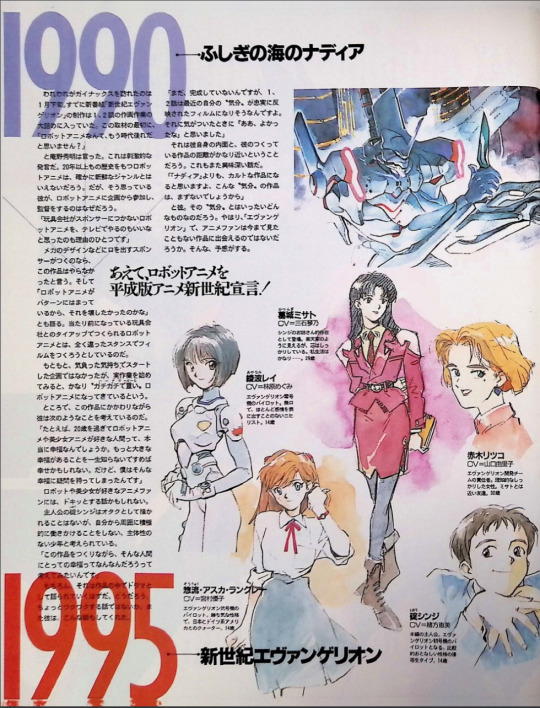
Even here, once it transitions to discussing Evangelion, Anno is promising "something anime fans have never seen before". It was a common refrain in all the marketing material throughout 1995, that this show was going to be special. The manga adaption actually began print in February of 1995, as a hype builder. The Evangelion team was putting it all on the line.
Also I love that early concept art - the more gundam-esque pilot suits over the plugsuits would have absolutely been my jam, alas.
(This marketing material is more evidence against the mythical "mid-production pivot" theory that fans in the past surmised about Eva's intended story, but a topic for another time)
Still, this is just marketing - who wouldn't say your show will Change Everything, that is your job as a business! For all the inner-otaku hype and rep, Evangelion was definitely targeted at those otaku, and it wasn't marketed to an all-ages demo with wider appeal like Sailor Moon. Anno even remarks in the interview above it would be more of a 'cult hit' compared to Nadia. It had a Wednesday airing slot (at 18:30, not actually super late - another myth, it just had late night re-runs after its evening air slot), not a great time and definitely not a Saturday evening slot like Sailor Moon.
It was a show that instead grew over its airing and broke out of its slot and genre - its finale got audience ratings almost twice that of its premiere (though these numbers are hard to aggregate over different stations). Its about midway through its run that you start getting those "phenomenon of Evangelion" style articles, and when the ending hits the culture critics start jumping in as well and it becomes a true cultural event, and discussion of the show in mainstream magazines starts happening. That wasn't happening in 1995.
I wish I could say it all culminates with End of Evangelion being released and being the #1 film of the year and all that - but while it did well it got its clock absolutely cleaned by Princess Mononoke, which came out the same week. An honourable defeat at least!
Hopefully this is a good answer! Definitely more to be said on the topic, man this would be a great deep dive project...
#evangelion#anime history#also you had a great reply to my miyazaki walk cycle post and i never got to reply I am sorry -_-
45 notes
·
View notes
Text
Ancient Magus' Bride season 2 is off to a fantastic start.
I also watched the OVA episodes, but I have very little to say about those other than their purpose being to basically show how much Chise has grown via having her save the version of herself she was at the start of the story.
It was to reiterate and remind us of the character arc she went through and where her mindset is at the point in the narrative where the OVAs take place. (End of season 1.)
Turning to the season 2 premiere, what I love about Magus Bride is that it's basically dark fantasy shoujo Evangelion with less abstraction and more cool ass mythology and fantasy elements.
At this point Chise's baggage is rivaling that of any of your standard guy protagonist, from involuntary immortality to memory manipulation, but the great part to this is that those details alone could probably fill enough material for this season alone.
Also, roses now give me Utena PTSD, especially when mentioned in the same sentence with those two concepts I listed above and the idea of going to school, also in conjunction with her becoming a potential test subject.
Her thoughts when just standing there in front of her new dorm room were fantastic.
Magus' Bride's wierd premise frustrates me so much because the story itself ends up being about so much more (and being much less creepy than it seems) and just this first episode of season 2 laid it all on the table.
(I'm still hoping that the whole thing ends up with her and Elias going their separate ways because to me that seems like the natural end point to that healthy growth.)
I'm so happy Elias has remained a wierd Eldrich creature with the arc to learn how to be a person, too. There are points where he takes a human form, but I like that the story treats his "real" form, well, like his actual real form and his human forms are always a little "off".
Finally, the one thing that did bother me about the first episode of season 2 were the production values. Even the opening was super inconsistent, switching between fairly simple shots and super-detailed and extremely beautiful shots.
This is why I'll probably strive to get this in manga form, too. Not only to see the differences, but also to probably get a more "consistent" version art-wise.
Can't wait to see Chise take care of the other versions of herself while wierd fantasy stuff happens in the background.
Naturally, as with a lot of stories, this series could get worse, but for now this premier only reaffirmed my like.
5 notes
·
View notes
Text
The Great Anime Rewatch of 2024 - Part VI
Magic Knight Rayearth
First watched: circa 2006? Maybe? Rewatched: February 2024
Original rating: 5 New rating: 5
This is very ‘baby’s first anime.’ Far be it from CLAMP’s best work, it fits in perfectly with all the isekai shows currently drowning the market. Rayearth also is one of those stories that feels specifically intended to be enjoyed by a specific age group of a specific gender and little else. It at least hast he benefit of having magical girls and mechs, making it less generic than having a bland male wish fulfillment hero. I also like how the girls’s armor evolves. But Rayearth really is nothing special.
__________________________________
xxxHOLiC
First watched: circa 2007? Rewatched: February 2024
Original rating: 5 New rating: 4
The colors look so flat and washed out. I also forgot how much anime original material was here, too. Similar to like how I remembered, the only things I really liked about this adaptation are the music and the voice cast. Ah, the illustrious history of weird, botched CLAMP adaptations.
__________________________________
Tsubasa Chronicle 1 & 2
First watched: circa 2006? Rewatched: March 2024
Original rating: 4, 4 New rating: 2, 2
Bee Train, your art style is awful. Just like xxxHOLiC, the colors here look dull and flat. The animation is also abysmal, with consistently off model characters and abnormally slow blinking. It doesn’t help that the anime has a lot of closeups and long shots on faces that I’m sure someone thought were very dramatic. But it’s just awkward standing and staring—a clear effort to cut corners. Also, the pacing is terrible. Why did we spend four and a half episodes in kudan-land? It’s an absolutely botched adaptation that happens to have a fantastic soundtrack, courtesy of Kajiura Yuki. (That opening song I never liked is still bad, though.)
As for the second season, it wouldn’t have been so bad if the anime original episodes hadn’t been so uninspired. Whose idea was it to have everyone revisit previous worlds? Also that final episode always bothered me, even as a kid. This dumbass is made up of Sakura’s feathers, and she only absorbs one? Bro, what? If only Bee Train hadn’t gotten their grubby hands on Tsubasa, and they started the adaptation later in the manga's run. Production IG really saved us with Tokyo Revelations.
Also, for the record, an animated work can still not look the best and still have good visual direction or interesting imagery. (I.E. Jimmy Neutron, Revolutionary Girl Utena.)
__________________________________
Noir
First watched: circa 2006 Rewatched: March 2024
Original rating: 6 New rating: 4
This was one of the first anime I watched in Japanese. Since then, it’s mostly stayed with me in the form of its soundtrack. But how does the actual material hold up for me nearly twenty years later?
Not very well. The beginning has so many problems: episodes 2-4 have absolutely nothing of importance or of consequence. Even after that, we learn almost nothing about either Kirika or Mireille, and the episodes are terribly repetitive. As bitching as the music is, it feels like there are only five songs because they’re reused so often.
Revisiting Noir was a boring slog. I don’t think this story warranted a 26 episode TV series. It would’ve been more suited to an hour and a half long film.
__________________________________
Cowboy Bebop
First watched: 2009 Rewatched: March 2024
Original rating: 10 New rating: 10
The Great Anime Rewatch of 2024 is, frankly, not going very well. Let me revisit something I know I’m going to love. From my very first viewing, I knew Cowboy Bebop was a masterpiece. Since then I’ve rewatched it numerous times. I’ve always been bad about talking why I love this show. But it only resonates with me more as I get older.
Cowboy Bebop is about a spaceship of fools. Fools who fail constantly. And when they find success, there’s no victory in it. Yet this cynicism is wrapped in quiet confidence and unbridled commitment to style and atmosphere. And it’s accompanied by one of the greatest soundtracks in anime. Also, its sense of humor is incredible.
0 notes
Text
having more time to think about Mobile Suit Gundam: The Witch from Mercury (Gwitch), here are some of my very loose and disorganized thoughts:
as people have pointed out, Gwitch ep 1 shares a lot of similarities with Utena, and i’m really hoping it goes hard on dissecting the systemic oppression like Utena—it’s a very capitalistic society, and Miorine’s dad is playing that system like a pro and using it to crush the people in his way... sometimes literally. (and i gotta say: even though he’s only a product of the corrupt system, someone needs to take Miorine’s father down a peg. hope he rots in hell!)
Guel Jeturk is very much an expy of Saionji in Utena, and seeing him get what he deserves is so goddamn satisfying. imo, what made Saionji compelling even taking his nightmarish behavior into account is that he’s obviously a laughing stock to the characters with power (this man eats shit constantly, and you love to see it!) He also has moments of clarity about the effects of the system he’s operating under—it’s a little tragic as he comes to the realization that participating in the duels (the patriarchy) is folly, but can’t help himself from being goaded into doing it all over again.
Now, Guel similarly is treated as a laughingstock—even his fangirls laughed when Suletta sassed him—but it remains to be seen if he gains enough self-awareness to recognize how the system he’s participating in harms him and the people around him. (that said, i don’t think a ‘redemption arc’ is necessary; it’s fine if he remains a jerkass who gets what’s coming to him, as long as he’s a complicated jerkass.)
We see two other guys and one other girl on the dueling committee, and i’m assuming they’re Miorine’s other ‘official’ suitors—though given that anyone with a MS could enter a duel with the current Engaged (and maybe even with other students), maybe there’s no concept of ‘official’ suitors, and committee members are paper-pushers who deal with dueling logistics. it’s interesting that the dueling system obviously favors pilots to inherit the company (via engagement to Miorine); Miorine’s dad is ex-military, so it makes sense that he’s biased towards having a fighter as his heir (instead of his own non-combatant child).
(this does make me wonder what it’d be like if Miorine was his son instead of his daughter—would he have sold his son to the best MS duelist the same way he’s doing to his daughter, or would he have pushed his son to become someone who could wield a MS?)
given that gay marriage and queer relationships are commonplace in the setting outside of “provincial” Mercury, I hope that there are other queer characters too—Suletta and Miorine are cute, but we should see evidence of other same-sex couples if it’s as normalized as it’s stated to be. (I also hope other queer identities are normalized in the setting as well).
as for our leads, i like them! i don’t necessarily need Miorine to become a badass elite pilot, but i wouldn’t complain if she does become one (as long as the journey is convincing). I’d prefer it if she was able to take the reins of her own destiny without becoming one though, because i think it’s more powerful to show that there are multiple ways to take down an abusive system. I really hope it’s not going to come off as “manipulative woman gets people to fight for her”—but judging from the materials released so far, I don’t think we’re in danger of that kind of framing.
on a related topic: it’s clear that Miorine’s male suitors are mostly in it to inherit the company, and there’s no indication that they—along with most of the school’s population—have any respect for Miorine as a person. it’s an interesting dynamic in that she’s technically the princess of the school, given who her father is, but is treated like dirt by most of the student population due to her father's dehumanizing treatment of her. i hope the other students start respecting her later in the show, and not just because of how strong her fiancee is.
21 notes
·
View notes
Text

(Newtype Magazine, July 1997!)
Gogai, gogai!! Empty Movement SITE UPDATE.


You like Utena? You'll find something to chew on here! As always, check the site for deets, but let's blow through some highlights!!!
Translations: - TWO TRANSLATIONS of the 2017 Chiho Saito and Kunihiko Ikuhara Special Talk published as part of the media surge around the 20th anniversary After the Revolution manga. One from an Italian print, and then one from the Japanese! Neat huh? Thanks mint, Nagumo, and Ayu Ohseki! - Ikuhara in 2000 at Annecy France, originally posted in French, and translated by SmashGenesis!
Gallery: - HOLY STORYBOARDS. Storyboards for episodes 18 and 20 are recent grabs by me, and episode 24 is a gift from cscratch!! I even made a forum thread analyzing episode 18, which is full of cut shots and edits not in some of the others! - Some incredible production material drops, including the Blink of Betrayal and the Kiss at the end of Adolescence!! You've seen the animated versions of the blink and the kiss right here on Tumblr! Thanks tea and JadeSabre!
And 'finally'... Bibliothèque: -DOZENS AND DOZENS OF MASSIVE SCANS OF UTENA CONTENT PRODUCED IN NEWTYPE MAGAZINE DURING ITS RUN. Yep, that's right, every Utena page, from every Newtype Magazine, from 1997. A HUGE project completed here, with a handful of other magazines also added to this section, like MdN and Puff! Check it all out!!
That sums it up, check the site, check the links, and DON'T FORGET:

#revolutionary girl utena#utena#empty movement#utena meta#anime storyboards#newtype#newtype magazine#utena production materials#rgu#sku
185 notes
·
View notes
Text
Basically where Evangelion fails and Utena excels is that the intricate worldbuilding of Eva was something that Anno never really cared about and it was all a vehicle to explore characters and their emotional turmoil, the wordbuilding was put together as the series went along and often changed. However Eva is still presentes as a sort of realistic sci fi story, and while it is a good work, this aspect being neglected gives a lackluster impression and raises questions the show was never interested in answering (that then does in a neverending production of side material that also keeps raising more questions).
Utena never cared about the world making sense physically. It always presented itself with a surreal tone. Everything present exists to reinforce the themes of the emotional plot and it's pointless to aks how is this here, the important think is why.
4 notes
·
View notes
Text
I've been catching up on anime watching since I've been back home. There's actually a lot of interesting shows this season!
There's the sequel to Spy x Family, which is reliably good and entertaining (a little bit too much tbh, it feels a bit too much like a heartwarming product at times).
There's Raven of the Inner Palace, an ancient China fantasy Josei adaptation, which is gorgeous. Storytelling is a bit rote, but decent enough to watch.
There's Gundam : Witch from Mercury, which is taking some cues from Utena and therefore grabbed my attention even though I've never watched a Gundam series before and don't much like Mecha action. It's been very good so far (I'm 3 episodes in it).
There's a modern adaptation of Urusei Yatsura which I'm curious about because I loved the old one when I was a child. Not sure it's the sort of material that has aged well enough for 2020 but I want to check out another episode before I rule one way or the other.
Am I missing out on any other good anime series this season ?
4 notes
·
View notes
Text
RGU Commentary and Interviews
There’s a lot of great material from the creators of RGU, but it can be hard to know where to start. To make finding things easier, I’ve created a guide to the most interesting creator interviews and commentaries. Huge thanks to Empty Movement and all translators who’ve worked on these pieces over the years!
Ikuhara video interview from the final boxset
A classic interview that many people have seen. Ikuhara discusses Anthy, the Shadow Girls, and his hopes for the series’s entertainment value. He ends on what message he wanted RGU to send and how Utena’s character embodies values he cherishes. A great start for getting into creator materials.
Utena (Oh My!) UTENA
This is a special entry on this list. Originally released while the final arc was airing, it is a compilation of art, comics, and commentary from the RGU creators. Thumbing through it, you get a sense of each contributor’s tastes and personalities. The 52-page piece ends with a very insightful interview from Enokido, RGU’s lead writer.
Ikuhara and Saito episode commentary: 37, 38, and 39
These commentaries were included in a no-longer-available English release of RGU. Ikuhara and Saito’s talk ranges from serious discussion of themes, behind-the-scenes development, and silly conversation between friends. You really get a feel for their relationship in these.
Enokido Privacy Files
Nearly lost to the ages, these are writings by Enokido that focus on Touga, Juri, and Akio. Provides major insights into Touga’s character that were only briefly touched on in the film. A must-read in my opinion!
Disturbing, Traversing, Borderless, Shaking Sexuality: The Place where Revolutionary Girl Utena was Born
Absolutely stellar interview between Ikuhara and art critic Mari Kotani. The translation work is superb, with many links and pictures providing cultural background. This interview was published in an academic journal published by Musashino University. Ikuhara and Kotani discuss a wide range of topics surrounding gender, sexuality, and society. This piece has had a massive impact on how I approach Ikuhara works and gave me a new vocabulary around subversive art.
Be-Papas Interview
This entry, an interview with Ikuhara, Enokido, and character designer Hasegawa, is far less serious than others on the list. It was published while RGU was still airing and mostly features the Be-Papas members joking around and refusing to give straight answers. The reason I included it is that I think it gives you a picture of the strong collegial spirit that went into RGU. You get a sense that these men share common values and truly appreciate working with each other. Without an atmosphere like that, RGU would never have been made.
Japanese Laserdisc Episode Notes
Easily missed, these notes are tucked away on Empty Movement’s Other Contributors page. It is unclear who wrote them--perhaps a mix of different staff members. There are notes for episodes 17 through 36. Much of the focus is on the production; for instance, which member of the team was responsible for which element of the show. However, there’s also lots of hints about the intended meaning of various symbols, motifs, and character beats. Particularly interesting to me are the explanations regarding character and episode names.
Mamoru Hosoda Interview
After serving as a storyboard artist on RGU, Hosoda went on to direct films of his own such as Wolf Children and Summer Wars. Here he is talking about the character he was most responsible for bringing to life: Juri. This interview helped me parse out what the meaning of “miracles” is in RGU and the importance of the Ruka/Juri/Shiori triangle. There has been controversy over this interview, so I invite people to read and see what you think for yourself.
Translation Project: Revolutionary Girl Utena Script Collection Part 1 and Part 2
New! The wonderful Nagumo has translated all of Enokido’s episode commentary. Not as extensive as Ikuhara’s, he nonetheless goes into more detail in places, including some very interesting musings on the underlying meanings of the show. The deeper you get into the commentaries, the more surprising the revelations become.
2001 video interview with Ikuhara
This interview took place at the Big Apple Anime Fest in the US. Though fairly short, Ikuhara demonstrates his trademark humor and personality. The main reason I included this one is that Ikuhara addresses the use of queerness/lesbianism in his works in a very thoughtful manner.
Ikuhara Audio Commentary: Adolescence of Utena
A transcription of an audio commentary that was released along with the movie. This one especially focuses on the aesthetics, but Ikuhara also discusses some of his views and how he expresses them in his art. If you’re interested in the production side of RGU, I would check this out.
Interview with Igarashi Takuya
Igarashi Takuya was a director, script writer, and storyboard artist for RGU. He appears to be a particular fan of Saionji and discusses his character in depth. Additionally, the interview goes into aesthetic choices, the show versus the film, and what it takes to be a duelist. Interesting insights from someone who wasn’t a part of Be-Papas.
The Spell of Cults: Ikuhara Kunihiko x Enokido Yōji Conversation
A great crossover interview between RGU’s lead director and writer. They discuss the show’s wider sociological context and what makes a character a duelist, all the while showcasing their eccentricities.
Utena 2011 Boxset Booklet Commentary and Ikuhara Episode Commentary
An absolutely MASSIVE amount of commentary from the creators, primarily Ikuhara. The first link leads to some of Ikuhara’s episode commentary, staff thoughts, the laserdisc liner notes, and other fun extras, including thoughts from composer J.A. Seazer. The second link contains all of Ikuhara’s episode commentary. Great both for people interested in RGU’s themes and its production.
Eulogy for the Fool - Ikuhara Kunihiko and Ohtsuki Kana Discussion
This interview is between Ikuhara and artist Ohtsuki Kana. An interesting entry because it was released in 2017, the latest piece on this list. Because of this, Ikuhara’s works Penguindrum and Yurikuma are also discussed. It’s essential reading on RGU’s legacy and Ikuhara’s storytelling/character writing preferences.
Enokido Yoji Interview: The Reality of This World Is Called Anthy
Stellar interview with Enokido, mostly focused on Anthy and her position in the narrative. It informs how I understand Anthy greatly. Also goes into deeper themes of RGU surrounding reality, ideals, and personas.
Ikuhara Kunihiko & Takemiya Keiko - Utena interview JUNE 1998
For the final entry on this list, I’m including Ikuhara’s discussion with Takemiya Keiko, a highly influential mangaka whose works span many genres. Not only do the two touch on RGU, but also some of Takemiya’s works. The interview contains a great deal of humor, with Ikuhara elaborating on what “prince” and “princess” mean to him. The Spell of Cults. Ikuhara Kunihiko x Enokido Yōji Conversation
119 notes
·
View notes
Text
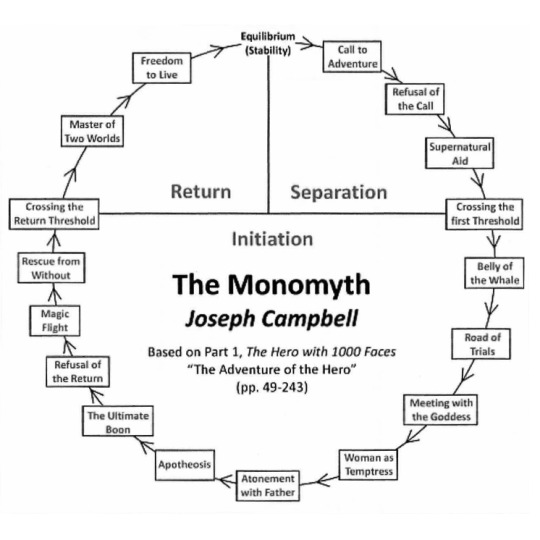
I think in my hurry to get through the one core rant without getting distracted, I didn't actually outline the Hero's Journey's whole proposed psych model in the first place. I don't want to get too into each of the 17 steps, but the idea of the process it reflects is this:
A boy on the cusp of adulthood must leave the comfort of parental protection/provision, whether he wants to or not. He must seek out the "magic" of an older mentor who has seen and mastered the unknown, and through that mentor they learn an entry level skill that will allow them to navigate the world of adults; but this is not "mastery" and it is not "understanding" it is only the bare bones functionality of mimicry. Understanding comes later. This happens, often, while still in the comfort of the "home" realm, where the dangers of the unknown aren't in play yet. Then they leave for real and confront the shock of an unfamiliar world, of autonomy, and responsibility; for the first time in their life, if something goes wrong, no one is there to help them.
Campbell himself posits this next step can go a few different ways. His standard format suggests the Belly of the Whale, the descent into the darkness of not knowing happens at the threshold itself, comes first. That upon confronting the unfamiliar new reality of adulthood the immediate reaction is to be overwhelmed, and only after addressing that immense pressure and aimlessness does the boy get to proceed out into the world at large with the understanding that out here, he can actually die.
But the alternative to this is that the boy goes from the crossing of the threshold directly into the Road of Trials, putting at his his magic aide's skills to use, and learning new ones, until that momentum of that growth and learning plateaus, and then THAT is the moment in which the hero is consumed unto the Belly of the Whale, not when he first confronts a reality that is beyond him, but when he first realizes that it's beyond him; when the arrogance and ignorance of youth gives way to humility. Here he has been facing danger and challenge but only now does he confront the inevitability of death; he cannot keep conquering the unknown forever.
I prefer the Belly-second format, because unlike the Belly-first form's processing of the idea that he can die, this is the fact that he will die; and then what legacy does he leave behind? And this directly motivates his shifting attention toward...
The Goddess Reconciliation is my problematic fav of this whole thing... Campbell and Jung believed deeply in this old fashioned notion of Anima and Animus, that there was some nearly mystical bioessentiallist quality of explicitly segregated Male and Female psyche, and a lot of that doesn't scan great these days. BUT! Of note is that their fixation on this duality came largely out of the idea that the two, being innately separate and at odds, needed to be balanced for a healthy mind to exist. In the psychospiritual spiritual approach to myth this means the Goddess is in fact a man's inner feminine aspect that need to be appeased and made peace with. And that's actually pretty cool, weird inner-cosmological premise to that aside.
But in regards to the myth as guidance, this is also the step in the journey that I just call Respect Women. Because that's what's being taught. This is the moment that the young boy/young man, until recently high on his own power and accomplishments, and his ongoing conquest of the unknown is confronted by a woman of great power. She resides in a realm above him, and for the first time in his quest he cannot conquer his way through this. He MUST speak with, negotiate, and empathize with this woman and her needs in order to win her favor and approval, and sometimes very literally hand in marriage.
This power she holds over him is often pretty literally the ability to have children, tying back into the newfound need to secure legacy that I mentioned in Belly of the Whale. But it can also be inheritance of fortune, positions of power and rulership, etc... in the realms of mythological and fairytale narratives. But it also reflects the internal idea of the joining of Anima and Animus, in that this marriage in one way or another, material or not, must bring him peace of mind.
Then there's the Woman as Temptress phase, which is woefully underused. Granted it can come across as a bit sexist and cliche in many narratives, and it's easy to see how that doesn't feel "essential" to most Hero Journeys, but I think this is incredibly important. Again, I prefer the Belly-second model in which the hero's conquests naturally lead to arrogance (he's on a winning streak, and he is still just a kid doing all this for the first time; he's never known defeat, so how does he even know when to slow his roll?) and this is a repeat of that; he's learned to please one woman, why not use his tried and true method of learning new skills and putting them to use to please more women? And so his loyalty to his Goddess must be tested in order to teach him moving forward.
This is the trope about Prince Charming being a playboy because his only trait is seducing women, not being good to them --see: Utena's Touga, or Into The Wood's Prince brothers. This is where a man learns not to be a fuckboi.
And then the confrontation with The Father. The legendary big Vader moment. But it's not always a violent confrontation, and it's not always innately negative; at times it can even be a somber affair. A boy must learn to stop idolizing his father, and make peace with the truth that his father is just a man, full of flaws like any other. And by reconciling his father as infallible patriarch and the hero's own process of growth, a boy must learn that to succeed in life he must be more than his father is/was. And this tends to become a violent or literal physical conflict when the father in question is both still alive, and the very literal authority that must be overcome in the name of progress. The patriarch has established a system of order that he sees as preserving the safety and security of the world of the known, and he will protect that system even as it begins to fall apart. And as a man, not longer a boy, but a peer to his father the hero has to show the father that he is no longer the unquestioned arbiter and effectively take his place.
In this the boy becomes man, hero attains some kind of enlightenment, sees some deep truth to the world and now knows with some clarity what is best for the world. An arrogant assertion to be sure, but internal to the journey at hand it makes enough sense... Because with this understanding the Hero also discovers or distills the mysteries of this wild realm of the unknown into The Ultimate Boon: a tool or a symbol of the skills learned, that can be replicated or utilized even without the hero's personal level of understanding. And this thing must be delivered back to the mundane so that the next generation of children can use it to expand their realm of the known further into what had before been unknown; each subsequent generation of hero expanding the collective knowledge and understanding of the community as a whole.
And Hero must also often learn selflessness. This kind of comes into play more often when there isn't the innate establishment of a desire to foster a legacy that will out last him. In this case the Hero needs to be talked into going home, because the alternative is that he continues to dwell in this state of perfection. But if he lives out his life like this, he will die as just a singular man rather than the Hero of a people. This in turn motivate the Rescue in which someone has to break into his little bubble of personal accomplishment to bring him back. Yet again his ego must be tested, and he must be humbled.
And then he goes back home, he's a Master of Two Worlds, the known and unknown alike, and he delivers The Boon to the common people so their lives can be made better by it. He earns the Freedom to Live and melds back into a mundane civilian life, as a productive member of his society, as a father, and eventually as a new hero's Magical Aide and old wizened mentor.
Shit.. I let this get away from me and shifted my whole rhetoric halfway in... >:/ My point wasn't to outline the mythic structure but the psychological one. So let me try to just summarize briefly now:
A boy needs to leave the comfort of home. He has to learn many new skills, starting with being taught by a teacher. He has to learn his limitations, finality and fatality. To secure a legacy he seeks a wife; to get a wife he must respect women; to keep a wife he must not be a fukboi. He must be a better father than his was. He must learn to want to give back to his community, and then return with knowledge and/or resources to better said community. He assumes a mundane life, he has kids who will grow up as he did; he'll be their father to overcome, and their mentor to learn from in time.
↑This is the Hero's Journey that Campbell became so fixated on, and that George Lucas maybe kind of oversold and muddled with film savvy, but that the original Star Wars still managed to embody and launch into the public consciousness. This is the Hero's Journey I wish more people would talk about and engage with, rather than the color-by-numbers nonsense that it's been reduced to.
6 notes
·
View notes